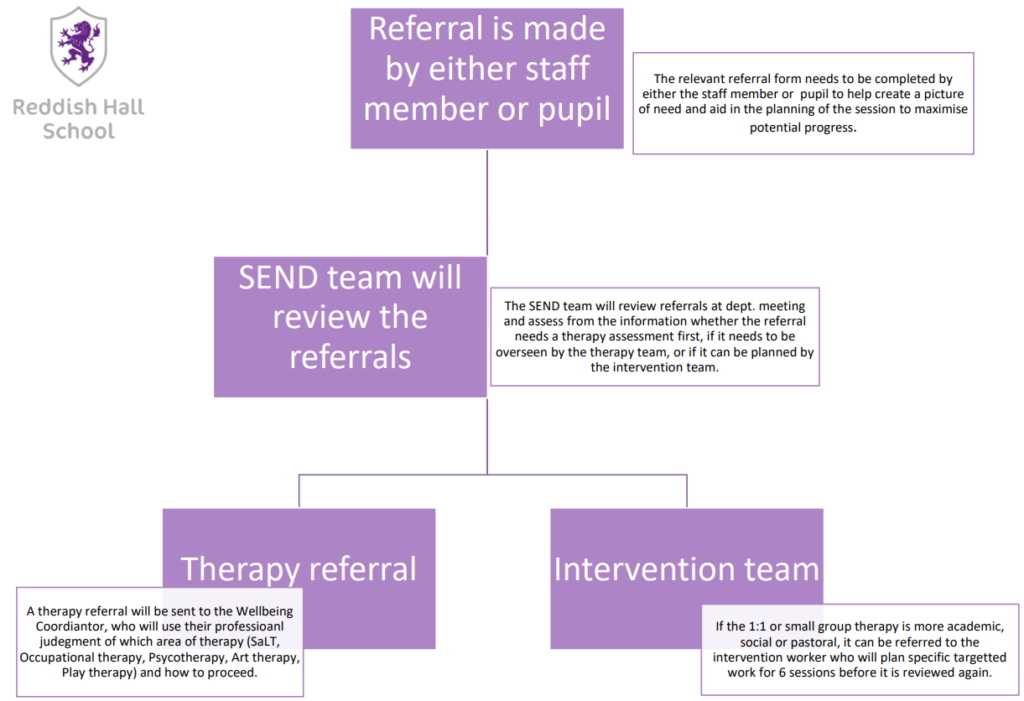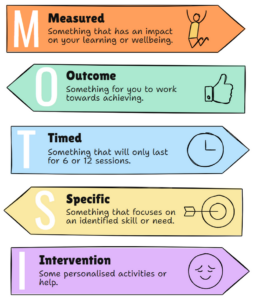The SEND Team
Head of School – Veronica Duggan
SENDCo – Kirsty Saggers
Assistant SENCo – Mel Dolan
Assistant SENCo – Mark Hodgson
SEND Administrator – Kay Mitchell
School’s SEND offer
Reddish Hall School follows a therapeutic curriculum, in which we support pupils social, emotional and mental health (SEMH) needs as well as their academic needs. The SEND team support staff in helping pupils meet their potential.
Support for staff and students are often universally met through the SLT and school staff approach. However, pupils can sometimes be identified as needing extra support to access their curriculum or SEMH needs, so a more enhanced and targeted programme of work may be needed.
Before a pupil arrives at Reddish Hall, the provision on their EHCP is reviewed. The SEND team then assess if this provision is met in school as a universal offer and as our school normal approach. Often this is the case, and provision can be met through the pathways. This is different to mainstream who often need to withdraw pupils from the classroom to meet these requirements.
Once at Reddish Hall, 1:1 and small grouped targeted intervention (MOTSI) is something which is offered to all pupils at Reddish Hall. There are numerous ways in which this is offered and referrals can be made, teachers or student support can make a referral if they can identify any additional needs or a barrier to progress which cannot be met by our universal offer.
Staff will need to complete the relevant referral form which is then sent to the SEND team to be assessed. Pupils can also refer themselves if there is something they feel they need some short term targeted work on.
Download the SEND Referral flowchart (PDF)
MOTSI sessions are planned for six weeks to ensure pupils are still accessing their curriculum. However, if it needs be longer this is reviewed by the SEND team to assess why progress has not been made and if further investigation is needed.
If a pupil’s attendance is low, a referral to therapy will be made instead of MOTSI.

MOTSI
The MOTSI team – Mark, Olivia, Jess, Abi, Jayne and Nikita.
- Numeracy support- This could be focused on a particular area which is impacting the pupil’s ability to make progress within numeracy based lessons. It can also be time used to help secure knowledge working towards qualifications such as Functional Skills. This can sometimes be paper based, sometimes focused on more practical/ hands on types maths, depending on pupils level of engagement and need.
- Literacy support – This could be focused on a particular area which is impacting the pupils ability to make progress within literacy based lessons. It can also be time used to help secure knowledge working towards qualifications such as Functional Skills.
- Reading – Reading intervention is normally referred when pupils reading age is below age related expectation, or their reading ability is so low it is also impacting their ability to access their curriculum. This is normally offered as a much shorter session, held more frequently and for a full term.
- Zones of Regulation – This is a programme of study which was created by an occupational therapist. The Zones is a systematic, cognitive-behavioural approach used to teach us how to regulate our feelings, energy and sensory needs in order to meet the demands of the situation around us and be successful socially. The overall aim of social emotional interventions is to support the students in developing emotional literacy, self-regulation strategies or to overcome specific challenges or patterns of behaviour. Student are often identified for this intervention because of presenting anxiety or difficult regulating emotions in school; this can be around particular lessons, relationships or social communication needs.
- Motor Skills United – An Occupational Therapy programme designed to develop all areas of motor and perceptual development.
Talk-about programme – Talk-about is a structured programme for teaching and measuring social skills. It uses a hierarchical method of teaching social skill, for example it recommend to work on self-esteem before conversation skills.

MOTSI – What we offer
1:1 or small group interventions on offer
- Maths academic (in or out of class)
- English academic (in or out of class)
- Phonics
- Spelling
- Reading
- Fine motor skills
- Gross motor skills
- Zone of Regulation
- Mindfulness
- Sensory
- Music
- Lego
- Healthy relationships
- Wellbeing (Specialist or Enhanced)
- SaLT (Specialist or Enhanced)
- Friendships
- Conversational
- Anger management
- Touch type
- Using IT software to support learning
- Careers (See our careers page for more information).
MOTSI Descriptors
English support 1:1
Provides a quieter environment with 1 on 1 guidance to support students further in spelling, phonics, reading, writing, playing games like scrabble, banana grams to start, then using whiteboards and worksheets to help break down the areas that the student is struggling with and help them work bit by bit to build their knowledge and ability up giving them different ways to help them interact and find new ways to introduce English not just in a classroom setting.
Social and emotional:
The overall aim of social emotional interventions is to support the students in developing emotional literacy, self-regulation strategies or to overcome specific challenges or patterns of behaviour. Student are often identified for this intervention because of presenting anxiety or difficult regulating emotions in school; this can be around particular lessons, relationships or social communication needs.
These interventions are initially based around the ‘Zones of Regulation’ programme to support the student in developing their emotional literacy and ability to communicate, understand and develop strategies for their emotions. This is also a school-wide programme that is used in class groups. From this, interventions can then focus on specific areas, for example, resilience or well-being.
Spatial Learning
The aim of this intervention is to help students who have difficulty with recognising mental representations of their environment.
In addition to spatial learning and language used during lesson times, this intervention aims to develop further spatial intelligence using spatial terms and activities in a bespoke approach to the individual.
The six-weeks intervention is to focus on developing the mind’s eye, which is a visualisation of mental representation of objects not physically present. This will help them recognise sequential patterns, discriminate between different objects and think one step ahead in a challenge.
Students will complete a series of picture challenges, open-ended spatial puzzles, memory recall building and abstract pattern activities through the intervention.
At the end of the six sessions, the students will be given a termly GL assessment to track their progression. The assessment will help teachers understand the student’s strengths and areas for improvement.
Spatial learning can be applied in all areas of a student’s life and it will support their problem-solving skills beyond education.
EHCP annual reviews and the involvement of school
The end of each term, a letter inviting parents to attend the pupil’s annual meeting the term after will be sent. Parents then need to confirm with the SEND administrator that they will be attending the meeting at the set date and time, or if it needs to be rearranged to ensure parents can attend. Meetings can be held in school, virtually or on the phone.
Parents need to return paperwork which was sent to the invite to school at least two weeks before the meeting.
If parents do not attend and do not communicate this with school, it is possible that the meeting could be held without them due to the other professionals attending.
School will only review the Education part of the EHCP. Social workers and medical professionals will need to submit their reports and updates to ensure this is reflective of pupils needs in the parts of the EHCP they are responsible for.
School will submit their review paperwork and reports within the two weeks window after the review has been held (as is required by Code of Practice) However, please note, the Local Authority are responsible for updating the document as a whole which may take longer.